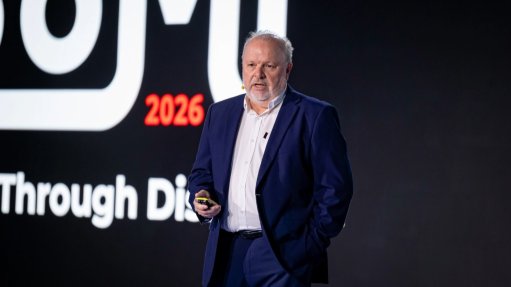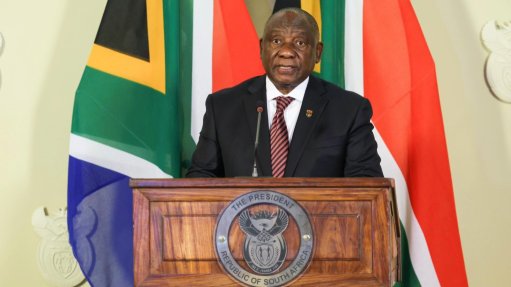Legislative certainty amid government shuffle crucial for continued renewable-energy investment

In this video, Absa Corporate and Investment Banking environmental, social and governance head Msizi Khoza, Absa regional operations strategy and business transformation executive Linda Sing, and Enel Green Power Southern Africa country manager Manuele Battisti discuss renewable energy investment in Africa.
A clear and certain legislative framework is critical for enabling sustainability and green energy investments in South Africa going forward, especially given the changes taking place in government following the unprecedented outcome of the May 29 elections, Absa Corporate and Investment Banking (CIB) environmental, social and governance head Msizi Khoza has said.
Speaking at a media roundtable event at the Absa headquarters, in Sandton, on June 26, he emphasised the well-documented transformative effect of clear and consistent legislation on the renewable-energy sector.
"For a long time, it felt like we were just on the cusp, and then suddenly there were significant changes to legislation. This led to a mountain of investment and huge capital flows being deployed. That’s the importance of clear legislation enabling investments to flow," he stated.
Given the changes taking place in government, Khoza highlighted the importance of maintaining continuity in renewable-energy targets, especially within the framework of the Renewable Energy Independent Power Producer Procurement Programme.
"The most important thing is to ensure continuity in terms of the trajectory of renewable-energy targets," he said, noting that this continuity would be crucial for maintaining investor confidence and ensuring sustained progress in the building of the renewable-energy sector.
Khoza further elaborated on the challenges faced by South Africa and the broader African continent in tapping into global capital flows related to climate change.
"One of the reasons why South Africa has been unable to tap into these global capital flows is the absence of a very clear roadmap. The Climate Change Bill, though still imperfect and yet to be signed into law, is a crucial piece of legislation that deserves more attention," he explained.
Khoza said the clarity and direction provided by such legislation would be pivotal in fostering investor confidence and facilitating the flow of funds into sustainable projects.
Absa regional operations strategy and business transformation executive Linda Sing highlighted an additional dimension to the conversation surrounding sustainability investments, expressing concerns about its potential elitist nature.
"There is a slight danger that we make this conversation relatively elitist in terms of the size of deals we do. Success will be seen in how sustainability and sustainable development truly embed themselves in communities," she noted.
To avoid an elitist, dispassionate and cynical view of sustainability investment, Sing stressed the importance of inclusive and grassroots-level engagement in sustainability efforts.
"What's really key is for bigger institutions, especially in the private sector, to facilitate and capitalise on these conversations, reaching the lowest levels of our communities. Sustainable finance, traditionally seen as a domain for large corporates, needs to become more accessible to smaller businesses," she said.
Sing added that sustainability investments should be undertaken collaboratively through the establishment of partnerships with communities, which needed to be both significant and substantial, leaving a lasting legacy over the long term.
"Sustainable national development depends crucially on these collaborations," she remarked.
Enel Green Power Southern Africa country manager Manuele Battisti added that it was necessary to establish and maintain a stable investment framework for fostering long-term sustainability initiatives.
"It's critical for large companies to have predictability in their investments, with a view that lasts at least three to six years," he explained. He pointed out that, in recent years, Africa had seen numerous changes, including improvements, but these had often been unpredictable.
"Now, we see stabilisation of these frameworks in a few important markets of Africa, which is essential for the electricity market," Battisti said.
Whie Absa CIB stood ready to invest in energy projects, Khoza reiterated the bank’s stance on financing coal projects.
"We don't support new coal-fired power generation. However, if we’re approached regarding financing an aspect of it, such as carbon capture or something like that, then we would look at the opportunity and it would be subjected to the normal processes. It’s really more about us needing to support a balanced energy mix. That's really what it's about," he explained.
This stance reflects the bank’s broader alignment with the transition towards more sustainable and environmentally friendly energy solutions while acknowledging the current reliance on coal and the need to improve its efficiency and reduce its environmental impact.
Article Enquiry
Email Article
Save Article
Feedback
To advertise email advertising@creamermedia.co.za or click here
Press Office
Announcements
What's On
Subscribe to improve your user experience...
Option 1 (equivalent of R125 a month):
Receive a weekly copy of Creamer Media's Engineering News & Mining Weekly magazine
(print copy for those in South Africa and e-magazine for those outside of South Africa)
Receive daily email newsletters
Access to full search results
Access archive of magazine back copies
Access to Projects in Progress
Access to ONE Research Report of your choice in PDF format
Option 2 (equivalent of R375 a month):
All benefits from Option 1
PLUS
Access to Creamer Media's Research Channel Africa for ALL Research Reports, in PDF format, on various industrial and mining sectors
including Electricity; Water; Energy Transition; Hydrogen; Roads, Rail and Ports; Coal; Gold; Platinum; Battery Metals; etc.
Already a subscriber?
Forgotten your password?
Receive weekly copy of Creamer Media's Engineering News & Mining Weekly magazine (print copy for those in South Africa and e-magazine for those outside of South Africa)
➕
Recieve daily email newsletters
➕
Access to full search results
➕
Access archive of magazine back copies
➕
Access to Projects in Progress
➕
Access to ONE Research Report of your choice in PDF format
RESEARCH CHANNEL AFRICA
R4500 (equivalent of R375 a month)
SUBSCRIBEAll benefits from Option 1
➕
Access to Creamer Media's Research Channel Africa for ALL Research Reports on various industrial and mining sectors, in PDF format, including on:
Electricity
➕
Water
➕
Energy Transition
➕
Hydrogen
➕
Roads, Rail and Ports
➕
Coal
➕
Gold
➕
Platinum
➕
Battery Metals
➕
etc.
Receive all benefits from Option 1 or Option 2 delivered to numerous people at your company
➕
Multiple User names and Passwords for simultaneous log-ins
➕
Intranet integration access to all in your organisation



















